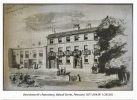Richard, Sir Marc Isambard Brunel (the father) -- 'On 24 March 1841 Brunel was knighted by the young Queen Victoria. This was at the suggestion of Prince Albert who had shown keen interest in the progress of the [Thames] tunnel.' Wikipedia.One wonders why the likes of Boulton, Watt, Murdoch, Priestly and both Brunels were never knighted ( and numerous more). Just thinking out loud. I happen to follow/read frequently about the aforementioned group.
Albert was keenly interested in Engineering, but he died in 1861.
Priestley was a dissenter and supported the French Revolution. I do not think he would have wished to be knighted.
I'm guessing that there was a general prejudice against trade and engineering and the owners of factories by the gentry and those who decided such things. Thomas Telford was the son of a shepherd, raised in poverty and apprenticed as a stone mason at the age of 14. He was buried in Westminster Abbey.
Derek
















